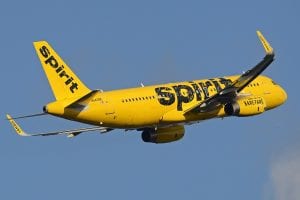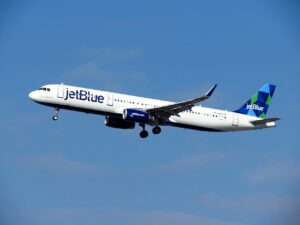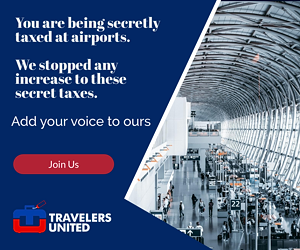Spirit: JetBlue appeals to my short-term pocketbook. Frontier may be the better long-range play.

Photo courtesy Wikimedia
One of the big decisions in airline mergers is being made these days. The Spirit Airlines merger battle is in full swing. Both JetBlue and Frontier have made offers for Spirit Airlines. The JetBlue offer is the best for investors looking for a quick buck (or $30 to $33). The longer-term investors who want to change the ultra-low-cost carrier (ULCC) landscape are looking hard at the Frontier offer.
The Spirit Airlines investors will be the ones who ultimately make the decision. Will Spirit stockholders vote for money now, or will they vote for their shares to strengthen the ULCC segment of the market and make it stronger and more competitive?
This bidding war for Spirit will create the 5th largest airline no matter who wins. But, the JetBlue offer will make a different kind of airline competition than Frontier.

Photo courtesy Wikimedia.
Each airline has different reasons for the merger. JetBlue may be looking at this as a way to buy planes and airline workers and pilots. Frontier probably sees the merger as a way to expand their ULCC system nationwide. There is the rub.
JetBlue may seem like a different type of airline than Frontier, with a distinct corporate culture. But it needs the pilots, mechanics, and flight servicing personnel to expand in the coming years. Looking at the merger from this angle makes the merger seem sensible. Whether one is operating as a mini-network carrier or a ULCC makes no difference in trained personnel doing their jobs. According to informal discussions about the cross-training needed to move pilots from one aircraft to another or mechanics from one engine system to another, becoming certified is not a problem.

Photo courtesy Wikimedia.
However, Frontier sees a similar corporate culture at Spirit. Frontier seems to be coming at this merger from another point of view. They see an opportunity to merge with another ULCC that has hired many of the same Spirit executives in the past.
A merger of Frontier and Spirit will provide the emerging ULCC with more planes, additional gates, increased slots, and the opportunity for better scheduling. Imagine a world where Frontier has more daily flights and fewer flights that depart every other day or once a week. The Spirit merger will allow such growth. Plus, the personnel working for this new airline will have a unified mindset regarding low-cost operations.
A pro-JetBlue outcome will mean much more work reconfiguring Spirit’s planes to match the layout of the JetBlue aircraft. Creating a match between Spirit and Frontier will be much simpler and faster.
One option is to strengthen JetBlue to compete on service with network carriers more effectively. The option is to create a low-cost national operation that will compete on price and costs.

It seems that leisure fliers vote with their pocketbooks and wallets. Business travelers vote for better service (they are generally not footing the bill). ULCCs focus on the bottom line and have more flexibility in scheduling planes and crews. Each has its benefits for leisure and business consumers.
What will DOJ say about the two mergers? Both the merger and the NEA must be approved or objected to by the Justice Department.

I can say with certainty that the AA/JetBlue NEA will take much longer to unwind and reach a DOJ settlement than just a decision on whether or not the Frontier/Spirit merger will go through. Hence, until the NEA settles, expect the JetBlue/Spirit merger to stay on hold.
This negotiation has already started, with JetBlue offering to sell many of the Spirit slots to get DOJ permission to go forward with both the JetBlue/Spirit merger and the NEA. I have no insight into how the DOJ plans to handle the NEA analysis regarding the hostile takeover of Spirit by JetBlue. Spirit Airlines’ Board of Directors spurned the JetBlue offer because of the ongoing DOJ lawsuit against JetBlue. They have also asked shareholders to withhold shares from JetBlue’s tender offer.
This merger became more complicated as it moved forward step by step.
Instead of only a fundamental airline merger, the DOJ finds itself forced to adjudicate both the NEA and a hostile merger at the same time. At this point, whichever vision of the future of Spirit Airlines is held by regulators and the airlines, it will need additional time to be worked out.
Perhaps, this regulatory and inter-airlines decision will be settled by Spirit’s shareholders in their upcoming vote. Perhaps not. The longer this takeover battle takes, the longer consumers will find themselves left in limbo.
READ ALSO:
Why travel to Italy can be a hassle — COVID tests for our return
What you shouldn’t pack in your checked luggage when flying

Charlie Leocha is the President of Travelers United. He has been working in Washington, DC, for the past 14 years with Congress, the Department of Transportation, and industry stakeholders on travel issues. He was the first consumer representative to the Advisory Committee for Aviation Consumer Protections appointed by the Secretary of Transportation from 2012 through 2018.
